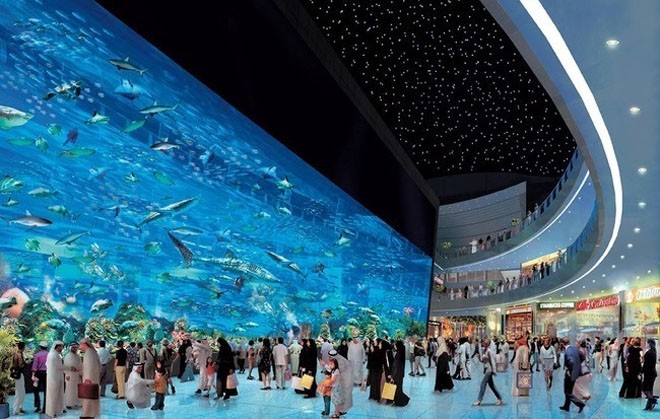
Dubai is a city where you can come see everyone’s place in the world

Eight days ago I got into the passenger seat of a van, pushed my seat back all the way and got ready for the drive from Abu Dhabi to Dubai.
Abu Dhabi is a bit like Islamabad. All the embassies and diplomats, big roads, little traffic, not a lot of people. Good to live in, the denizens of Abu Dhabi claim. I was bored to tears. I grew up in Lahore, last worked in Karachi. I was used to people.
As Dubai came into sight, it was all tall buildings, flyovers and construction sites. It’s big, vertically. Everything is supersized. They don’t do anything small here, other than human decency.
They have the biggest mall in the world. Even its aquarium is called an underwater zoo, I’m not sure if we’re meant to be watching the fish or they’re meant to be watching us, for the variety of humans in Dubai is even greater than its marine life. Indians, Pakistanis, Bengalis, Filipinos, Japanese, Lebanese, Iranian, Eastern African, then the tall Eastern Europeans and the gigantic Northern Europeans; backpackers, business people, hipsters, artists and the odd smattering of Emiratis in thobes. Very odd, given the geographical location.
I wanted to buy a thobe and take a photograph in front of the Burj Khalifa, the world’s tallest building, but a thobe was 1,500 dirhams. I don’t understand how a single white garment without embroidery can be so expensive. I figured it was cheaper to cut a hole in my bedsheet and pay the hotel for it.
The Lebanese women have all dyed their hair a dirty blonde, matching the faces of the men on their shoulders. I went to two extremely popular Lebanese restaurants. I had their Shawarma, their Shish Touk, their Baba Ganoush. It was all equally bland. Did they never discover spices up in Lebanon?
The services sector consists entirely of Filipinos. It seems like there are more Filipinos here than in Manila. Lower income jobs like porters, janitors, construction workers and cab drivers are all desi. At the malls, the toilets are where I hear our languages, spoken among the cleaning staff.
The massage places are mostly Thai, but I don’t get the point of a Thai massage. I went for a Thai massage and the lady punched, slapped, elbowed and sat on me. I’m sure it was very relaxing for her.
The cab drivers are all either from Kerala or Khyber Pakhtunkhwa. Pashtuns seem to have a big stake in the transport business. Three of my drivers were from Waziristan, they left when things started getting hairy there. What a strange expression: things getting hairy, maybe it was introduced into the vernacular by the waxing industry.
The drivers told me how they shared hostel rooms with nine other people. Four at a time because they alternated shifts. It was awful and they only went home once every two years but they save a lot of money here. They send home a lac a month, back home they could only earn a quarter of that.
I met a Pashtun man in Abu Dhabi working as a technical expert for their largest telecommunications company by which they meant he could crack into phones and fiddle them back into working condition. His maternal uncle ran a transport business here. He’s been here eight years and even though he misses his mother he’s only gone back four times.
"Over there I used to be out on my bike, stopped at every barricade, harassed by the police," he says. "Here I’ve already taken out a car, nobody says anything I can go wherever, whenever."
His name was Shahid Afridi. I told him to do his employers a favour and retire on time!
The cricket stadium is nice. You can see things better, closer up than Gaddafi’s shortened boundary in a gigantic stadium making for long distance viewing that requires binoculars.
Although bars and pubs are plentiful, the alcohol is expensive there. While liquor stores are strictly licensed and sparse in numbers, but there are dealers who deliver to your doorstep for a nominal charge. Home-like feels.
Despite all this diversity, the city is not a melting pot. Everybody is sharply divided by class and ethnicity. The Europeans and Arabs go to the plentiful bars but remain in their own cliques. Interacting among themselves. The tourists are briskly walking behind tour guides going from place to place like cattle. The Filipinos come out at night after their shifts are over to eat and take public transport back home.
It’s a city where you can come see everyone’s place in the world. Dubai is made for white people to come frolic around in the sun on the beach, and get scammed by eastern meditation instructors. I hate the sun, I’m sure most Pakistanis beaten by it all their lives would agree.
If you call a Careem the smallest car that comes to you is a Lexus. Everybody else has a Land Cruiser. There are so many showrooms here at first I thought the currency of the UAE was vehicles. If you wanted to buy some chocolate you had to trade in a Porsche. Apparently you can get them as cheap as on installment of 1,500 dirhams a month.
That’s only 500 dirhams less than what I pay for a single doctor’s consultation here. My Pashtun brothers tell me that if they have a major health problem it’s cheaper to fly to Pakistan and get treated. One got knee surgery for 50,000 rupees back home. Over here it would’ve cost him seven lacs.
I suspect Dubai also has the world’s longest underpass because I entered one that I thought would never end. The Metro trains run over the city on regular intervals. Dubai is Shahbaz Sharif’s blueprint for Lahore.
Orange Line, Packages Mall, the popularity of the Baskin Robbins that’s just opened in there. It’s all eerily similar…